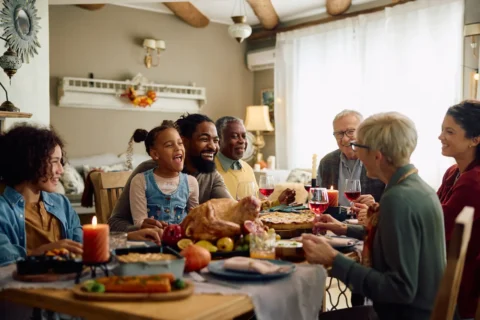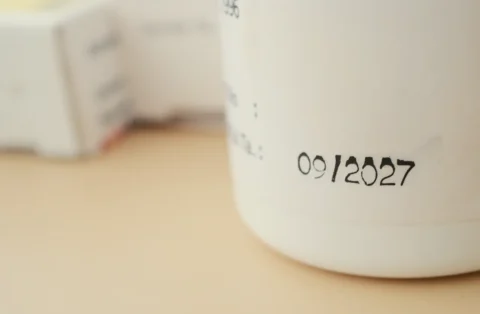What you’ll learn
We’ll cover practical strategies for staying sober during the holidays, how to handle triggers and cravings, and what to do if you experience a relapse or feel one coming on.
If you’re in recovery, the holidays can feel like navigating a storm. Everything that usually keeps you grounded gets pushed to the side. Your routines change, stress can pile up, and it seems like alcohol or the temptation to use substances is everywhere. Revisiting old places, old friends, and old family dynamics can leave you dealing with triggers or cravings when you’ve been working so hard on your sobriety.
While the holidays can feel overwhelming, they don’t have to be this way. With some planning and solid strategies, you can get through this season sober and really enjoy it. This article will help you prepare for difficult moments, handle triggers, and know what to do if things don’t go as planned.
Tips for maintaining sobriety during the holidays
Staying sober during the holidays can be tricky when it seems like everyone around you is drinking, maybe engaging in other substances, and alcohol is part of every celebration. But that doesn’t mean missing out on friends, family, fun, and making connections. If you plan ahead and keep a few strategies in mind, you’ll feel less anxious about the “what ifs.” Here are a few tips to help keep you focused and confident during the upcoming holidays.
Keep your hands busy and your glass full
Giving your hands something to do or having a full glass helps keep your mind off drinking and people from asking, “Can I get you a drink?” Mocktails, sparkling water with lime, or an non-alcoholic (NA) beer all work well here to let you just enjoy the party.
Have an answer ready for awkward questions
If you’re at a party, someone may ask if you’d like a drink or ask why you aren’t drinking. Most people are just trying to be polite or make small talk, not interrogate you. But having an answer ready can help you feel more confident and in control. If you don’t feel comfortable sharing your reasons for not drinking, try:
- “No thanks! I have an early day tomorrow.”
- “I’m the designated driver tonight.”
- “I’ve cut back because I’m on a health kick.”
- “I’m doing a dry holiday challenge this year.”
- “I’m cutting out drinking calories so I can enjoy more holiday treats.”
- “I’m not drinking tonight.”
Bring an accountability buddy to parties
Having someone you trust by your side can make you feel more comfortable and less alone in staying sober. You can check in with each other throughout the night and give each other an out if things get to be too much.
Be choosy with gatherings
It’s okay to skip out on events where heavy drinking or substance use will be a main feature. Protecting your sobriety is a smart move, not an antisocial one. Also, be careful about going to parties where old drinking buddies or substance users may be. Not because they’re bad people or you don’t like them anymore, but because it may be harder to say no when there’s history involved.
Remember the 20 minute rule for urges
Most cravings will come on, peak, and then fade all within about 20 minutes. Instead of fighting it, ride it out. Notice the craving and realize that it will pass. Set a timer for 20 minutes, then occupy your mind with something else. If you’re visiting family for the holidays, excuse yourself to go outside to call a friend or go for a walk. You can also play a game on your phone, solve a Sudoku puzzle, or do a few math problems (really!). Anything you find engrossing and that activates the prefrontal, problem-solving part of your brain will help. And when your timer goes off, the edge from the craving should be gone.
Remember your whys for sobriety
Sometimes it can help to reflect on why you decided to get sober in the first place. It helps you keep the momentum going and realize how far you’ve come. Even if you’ve hit some bumps along the way, progress isn’t always a straight line. Give yourself credit for showing up and celebrate positive things you’ve gained through your sobriety. Thanksgiving and the holiday season are a great time to focus on gratitude. That can include being thankful to yourself for working hard on your sobriety and for your support system.
Know your triggers and avoid them
Triggers are any subtle cues that prompt a desire to drink or use. Add friction to the habits you’re trying to avoid, and sober holidays get much easier. Here are a few things that make it harder for triggers to catch you off guard:
- If passing a liquor store on your commute tempts you, take another route. The same goes for driving past a place you strongly associate with visiting before you started your recovery journey.
- Have a replacement treat or activity prepared for when a trigger hits. Whether that’s exercising, painting, or your favorite candy, find something that engages your body, mind, or both to distract you.
- Find new places to hang out that don’t have memories of drinking or using attached.
- Remove alcohol from the house and don’t store drinks for guests.
Take a breather if you need it
Managing triggers sometimes means managing the environment you’re in. People, places, certain emotions, memories, or even a simple word can trigger a craving. This can also happen if you’re away from home for the holidays and find yourself in unfamiliar surroundings. If you find this happening, walk to a different room or outside and take a few deep breaths to recenter yourself.
Relaxation techniques, such as box breathing, can moderate the response you’re having and help you feel more in control. Practicing these techniques daily, even when you aren’t stressed, makes them more effective for when you do need them.
Benefits of staying sober during the holiday season
Staying sober during the holidays lets you actually enjoy time with your loved ones without the next-day regret. Every time you choose not to drink or use, you are strengthening your brain and body, “rewiring” yourself and reinforcing your commitment to the person you want to become.
These small wins compound over time for huge gains over the long run. Having a happy sober Thanksgiving can lead to a sober holiday season, which turns into lasting changes in your life. Here’s what sobriety during the holidays can bring you:
- Clearer mind: More mental clarity and sharper thinking, less fuzziness and brain fog.
- Steadier emotions: More control over your emotions without the highs and lows that come with using or drinking. Also, less anxiety, depression, and those “what happened last night?” regrets.
- Stronger relationships: Building trust and being more present for the people in your life who matter.
- More money in your pocket: The money you save can go towards hobbies you enjoy, people you love, or long-term goals.
- Better sleep: You’ll sleep more deeply and wake up feeling refreshed, instead of groggy and dehydrated.
- Healthier body: Your body gets a break from processing toxins, which means improved health markers, more energy, and clearer skin.
- Real confidence and self-respect: Keeping promises to yourself builds a genuine sense of pride and momentum towards future goals.
- Better performance at work or school: Improved concentration and steady energy lead to more consistent output, better follow-through, and greater overall productivity.
Navigating a relapse
Having a slip-up this season doesn’t mean the end of your recovery journey. You’re human, and it’s important to be kind to yourself. A relapse doesn’t define who you are as a person. It just means you need different strategies to manage cravings, stressors, and risky situations. You learned more about your triggers, so you can avoid them next time. Relapse can be a part of ongoing recovery, so treat it as useful information. Think, “Okay, I know this is a pitfall for me. I can move past this, and now I know what to watch out for.”
If you suspect you’re slipping, warning signs of relapse include:
- Having mood swings, and you’ve stopped taking care of yourself.
- Skipping therapy, meetings, or medications.
- Blowing off healthy habits and activities that usually help you.
- Drifting back to old places, people, or routines associated with drinking or using.
- Experiencing cravings and planning on using, even if “it’s just once.”
- Secretive behavior, isolation, or lying about what you’re doing.
- Thinking about the “good times” when you were drinking or using, forgetting about all the bad parts.
If you’ve relapsed or feel close to it, reach out for help right now. Call or text someone you trust or talk with a therapist or counselor. If you can, get rid of the substances or remove yourself from the situation. A 24-hour reset plan could help you get back on track:
- Eat something nourishing.
- Get some sleep.
- Do one activity that doesn’t involve drinking or using.
- Reach out to someone in your support system, whether that’s a friend, sponsor, therapist, or family member.
Take it one day at a time. You haven’t lost your progress, and you’re moving forward.
Reach out to QuickMD for support on your recovery journey
Planning ahead for tough moments can make the holidays a lot easier. If you need extra support this season, your QuickMD provider can help. We offer one-on-one guidance, real strategies for handling tough situations, and check-ins to help you stay on track. We have same-day visits and counseling accessible online, even on holidays.




